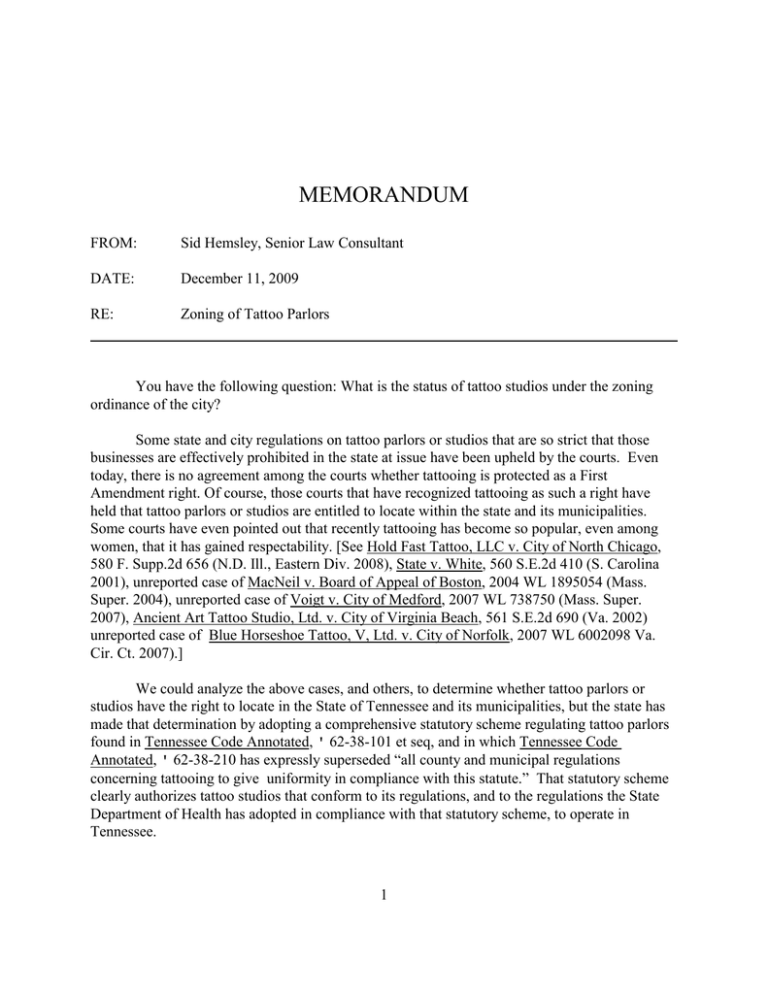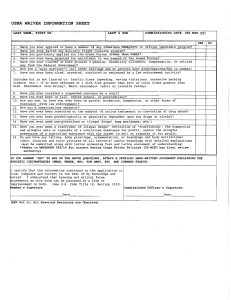MEMORANDUM
advertisement

MEMORANDUM FROM: Sid Hemsley, Senior Law Consultant DATE: December 11, 2009 RE: Zoning of Tattoo Parlors You have the following question: What is the status of tattoo studios under the zoning ordinance of the city? Some state and city regulations on tattoo parlors or studios that are so strict that those businesses are effectively prohibited in the state at issue have been upheld by the courts. Even today, there is no agreement among the courts whether tattooing is protected as a First Amendment right. Of course, those courts that have recognized tattooing as such a right have held that tattoo parlors or studios are entitled to locate within the state and its municipalities. Some courts have even pointed out that recently tattooing has become so popular, even among women, that it has gained respectability. [See Hold Fast Tattoo, LLC v. City of North Chicago, 580 F. Supp.2d 656 (N.D. Ill., Eastern Div. 2008), State v. White, 560 S.E.2d 410 (S. Carolina 2001), unreported case of MacNeil v. Board of Appeal of Boston, 2004 WL 1895054 (Mass. Super. 2004), unreported case of Voigt v. City of Medford, 2007 WL 738750 (Mass. Super. 2007), Ancient Art Tattoo Studio, Ltd. v. City of Virginia Beach, 561 S.E.2d 690 (Va. 2002) unreported case of Blue Horseshoe Tattoo, V, Ltd. v. City of Norfolk, 2007 WL 6002098 Va. Cir. Ct. 2007).] We could analyze the above cases, and others, to determine whether tattoo parlors or studios have the right to locate in the State of Tennessee and its municipalities, but the state has made that determination by adopting a comprehensive statutory scheme regulating tattoo parlors found in Tennessee Code Annotated, ' 62-38-101 et seq, and in which Tennessee Code Annotated, ' 62-38-210 has expressly superseded “all county and municipal regulations concerning tattooing to give uniformity in compliance with this statute.” That statutory scheme clearly authorizes tattoo studios that conform to its regulations, and to the regulations the State Department of Health has adopted in compliance with that statutory scheme, to operate in Tennessee. 1 You have previously sent that statute scheme and those regulations to the city. However, it does not appear to me that neither the statutory scheme nor the regulations preempt the right of municipalities to zone tattoo parlors; they require tattoo studios to obtain a permit to operate from the local health department, and to comply with a body of laws and regulations governing the issuance of permits, inspections, training, and health standards, etc. But it is that state statutory scheme that appears to support the proposition that tattoo parlors that comply with its tattoo studio regulations are entitled to locate in Tennessee municipalities. I have read the city’s Zoning Ordinance. It provides that the city has only five zoning districts: R-1 Low Density Residential, R-2 Medium Density Residential, B-1 General Business District, B-2 Neighborhood Business District, and M-1 Light Industrial District. It appears to me that tattoo studios would qualify for admission to the B-1 General Business District under “1. Personal, business, and professional services, and offices, excluding junkyards and other similar uses,” or “3. Retail business, including automobile and mobile home sales.” An alternative way to handle tattoo studios is to allow them inside the city B-1 district/s as a conditional use, primarily the conditions being that they have a state permit, and that they meet the continuing condition that they meet the state standards contained in Tennessee Code Annotated, ' 62-38-101 et. seq., and the regulations issued by the State Department of Health. However, the city does not have a provision for conditional use permits in its zoning ordinance, but one could be added. I am not sure how much of a practical difference there would be between allowing tattoo studios to go into B-1 districts and allowing them to go into B-1 districts as a conditional use; either way they are required to meet the state standards. If the State Department of Health and the county health department do a good job of regulating such businesses, presumably they would quickly intercept any problems with their operations. But the conditional use permit would add a city zoning enforcement element to their operations if they do not comply with the restrictive state rules that govern those businesses. 2




